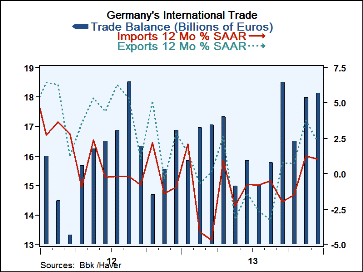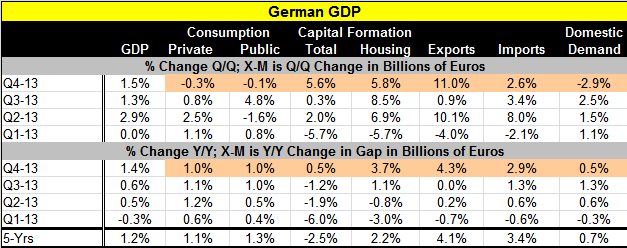 Global| Feb 25 2014
Global| Feb 25 2014German GDP Affirmed EU Commission Ups Outlook
Summary
German GDP: German GDP was affirmed at a 1.5% annual rate gain in the fourth quarter. However Germany continues to have the same issues for which it has been criticized over the past year. One of the stronger components of German [...]
 German GDP: German GDP was affirmed at a 1.5% annual rate gain in the fourth quarter. However Germany continues to have the same issues for which it has been criticized over the past year. One of the stronger components of German growth has been its exports. Exports, in the fourth quarter, grew by 11% at an annual rate. Meanwhile, German domestic demand in that quarter fell at a 2.9% annual rate.
German GDP: German GDP was affirmed at a 1.5% annual rate gain in the fourth quarter. However Germany continues to have the same issues for which it has been criticized over the past year. One of the stronger components of German growth has been its exports. Exports, in the fourth quarter, grew by 11% at an annual rate. Meanwhile, German domestic demand in that quarter fell at a 2.9% annual rate.
Sources of growth/strife: German exports rose 4.3% over the past year. Germany's domestic demand increased by only 0.5% over the same period. Let me connect the dots here. Germany, a relatively fast-growing economy, is increasing its output and employment by exploiting demand in the rest of the world, a world where demand is still weak. If you view `demand' as a scarce attribute, Germany is taking more of it for itself, instead of providing more of it for everyone else. Germany is expanding its current account surplus in the process. German GDP grew by 1.4% over the past year. Germany is growing and its growth is not of the source of demand that is helping other members of the European Monetary Union. German imports increased at only a 2.6% annual rate in the fourth quarter and German imports increased only 2.9% year-over-year.
It's all about me: The chart on the top shows German exports continue to outpace German imports. Germany has the largest current account surplus in the world. This surplus has been getting bigger. Understand that a high surplus implies a high domestic savings rate or, alternatively, a low pace of consumption. In this difficult world environment with Germany excelling under the Maastricht financial criterion and, with a strong financial position generally, it chooses to continue to run a high savings rate instead of supplying demand to help jump start the global economy or even EMU.
Back at the ranch: Nonetheless, there is general progress in other countries in the monetary union. The European Commission today has revised its forecast and that has been widely reported; it has lifted its forecast for 2014 as well as for 2015. However, we prefer to point out these are technical increases. The forecast for each year now embodies an increase of only 0.1%. This is the European Commission trying to whip up some enthusiasm without sticking its neck out.
Reports on the day showed weakness in Italian retail sales and slippage that was unexpected in Italian consumer confidence. Germany further distanced itself from other members of the monetary union as it posted a debt ratio under the Maastricht rules that equates to zero.
Just outside the common currency area, the UK posted a strong improvement in mortgage applications as well as again in its CBI survey that assesses retail trade trends.
A little farther outside the boundaries of EMU, China's leading economic indicator rose in January. Still imports dropped in the Philippines, as both exports and imports dropped for Hong Kong. Global indicators continue to prevaricate.
Beyond economic trends: Geopolitics now has Senator John McCain's worst fear in tow: the possibility of separatists in Ukraine. Apparently the parts of that country with greater sympathy with Russia are not responding to inquiries from Kiev.
The world economy has become a huge complicated and interrelated place to do business. Our international institutions are under pressure, rivalries continue to flourish, and the rules of free trade continue to be violated since there is no enforcement, except for the most egregious things done at the industry level. We have special political/economic units within the global economy like the EMU system. All of this just makes the world a more complicated place to operate.
In looking at Germany the one thing we clearly see is that countries do act in their own self-interest. Germany may wish to shift gears to `enlightened self-interest' as it is doing so much better than its fellow EMU members with which it has some common obligations. Still, the other countries of the euro area are making progress although it is clear that risks and challenges of a significant sort remain. The context of the global economy that we have briefly visited here shows still-uneven performance. The world map continues to be redrawn, as we work, trade and sleep.
What happens in Ukraine matters. Will it survive intact? Or will it wind up being partitioned or divided like the former Yugoslavia? The economic trends are important and they are improving. But the geopolitics cannot be ignored. The geopolitics is changing but it is hard to tell what that will mean for many key economic players.

Robert Brusca
AuthorMore in Author Profile »Robert A. Brusca is Chief Economist of Fact and Opinion Economics, a consulting firm he founded in Manhattan. He has been an economist on Wall Street for over 25 years. He has visited central banking and large institutional clients in over 30 countries in his career as an economist. Mr. Brusca was a Divisional Research Chief at the Federal Reserve Bank of NY (Chief of the International Financial markets Division), a Fed Watcher at Irving Trust and Chief Economist at Nikko Securities International. He is widely quoted and appears in various media. Mr. Brusca holds an MA and Ph.D. in economics from Michigan State University and a BA in Economics from the University of Michigan. His research pursues his strong interests in non aligned policy economics as well as international economics. FAO Economics’ research targets investors to assist them in making better investment decisions in stocks, bonds and in a variety of international assets. The company does not manage money and has no conflicts in giving economic advice.






